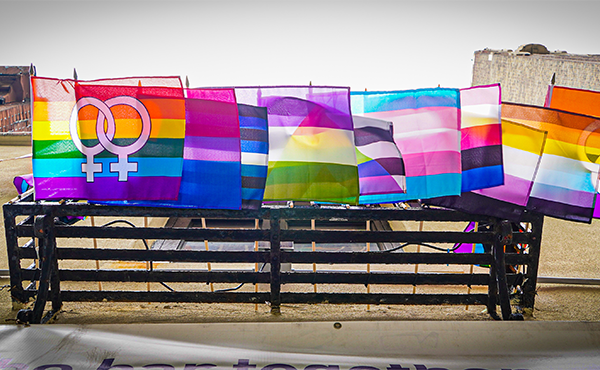Home > A Call for Continued LGBTQIA2S+ Aging Research
A Call for Continued LGBTQIA2S+ Aging Research
by Loren Talbot
From dealing with inequities in health care delivery to microaggressions to fear of mistreatment in eldercare settings, LGBTQIA2S+ adults face unique challenges as they age—and they deserve a health care system that delivers affirming care.
There has been an underwhelming amount of research and funding regarding how the LGBTQIA2S+ community ages. Additionally, research had failed to address intersectionality when discussing and evaluating the challenges of delivering supported care to seniors in the community. This has been slowly changing due to advocacy work, inclusion of sexual orientation and gender identity in public health studies, and a shift in a more diverse aging population.

Shall we agree that there’s an implicit message we often receive that acceptance is “good” and denial is “bad”? In Elisabeth Kübler-Ross’s stages of grief model, denial and acceptance are used to name two of the stages, and while we know the stages are not meant to be interpreted as neither linear nor hierarchical, most of us will automatically see denial as an “inferior stage” and acceptance as a “healthier stage” to aim for. We might think, “Let’s get past the denial stage to acceptance, because we really need to work with what is.”
Let’s reconsider how denial and similar responses very much can be working with “what is.” When reality shifts in a seismic way, as it does when we receive a terminal diagnosis or experience the sudden death of someone we love, denial can be a very protective, healthy response, and we’re wise to honour it, not attempt to push anyone past it. Acceptance will come as it comes—in whole or in part—and we need not impose an agenda on another’s process.

Research Validates Care Models
According to a 2021 publicationdy by our friends at SAGECare, LGBTQIA2S+ elders are twice as likely to live alone and four times as likely to not have children to support them as they age compared with people outside of the LGBTQIA2S+ community. Today around 3% of the population 50 and over self-identify as gay, lesbian, bisexual, or transgender on public health surveys. It is approximated that by the year 2030, there will be around 7 million LGBTQIA2S+ people in the United States who are 50 and older.
A federally funded study, The Evolution of Aging With Pride, highlights that the current elders in the community “came of age during periods when there was pervasive silence about sexual and gender identities, and same-sex sexual behavior was severely stigmatized and criminalized and gender roles were more strictly proscribed, prior to the civil rights, women’s and gay liberation movements.” Based on the study’s sampling of 2,450 elders in the community, the average individual experienced 3.47 incidents of discrimination and victimization during their lifetime.
The most common types of lifetime discrimination and victimization experienced by LGBTQIA2S+ people, according to the study of adults aged 80 years and older, “included being verbally insulted (39.9%), being threatened with physical violence (29.6%), and being threatened that someone would disclose their sexual or gender identity (23.1%).” This loudly calls for a trauma-informed care approach when supporting those in the community at end of life.
Voices from Worry and Wisdom: A Qualitative Study of Transgender Elders’ Perspectives on Aging speak to the concern around discrimination in an eldercare setting. “Nobody wants to end up in a nursing home because they don’t know what will happen to them. We don’t know what they would do to us in a nursing home with no one there to guard us,” said one 72-year-old transgender man in the study. Voices like his inform the EOLD community about the gaps that exist in providing safety… providing safety and gender-affirming care in our institutions that support elders at end of life.
A study out this past April from Vanderbilt University suggests a framework for addressing disparities by looking at macro-level systems, institutions, and structures that drive health disparities among aging LGBTQIA2S+ communities. The study identifies the global crisis around LGBTQIA2S+ health care needs, citing medical training both in the West and overseas and the need to move beyond a sexually binary system. It also calls for an understanding of current terminology and community norms in order to best deliver equitable health care. This speaks to the need for a curriculum reassessment by medical schools when delivering education about LGBTQIA2S+ populations.
We at INELDA strongly endorse the need for continued research and studies on aging for LGBTQIA2S+ adults. Additionally, the community can not be looked at monolithically; it is important to recognize the individual challenges each person confronts. Knowing how to best support the people you serve as a doula or as a health care provider will help to ensure that their voices are heard with compassion, understanding, and affirmation.
Supporting LGBTQIA2S+ End-of-Life Care
Get trained: SAGECare is a cultural competency training program for any organization or individual providing services to older adults.
- Know your community resources: Create a list of resources for the LGBTQIA2S+ folks you may be supporting in your doula practice. If you live in an area where no resources are available, research online and hotline support.
- Be an advocate: Educate your community with flyers and knowledge around language.
Continue to learn: The National LGBTQIA+ Health Education Center has an education section on older adults that health care providers can also acquire CME credits from.
